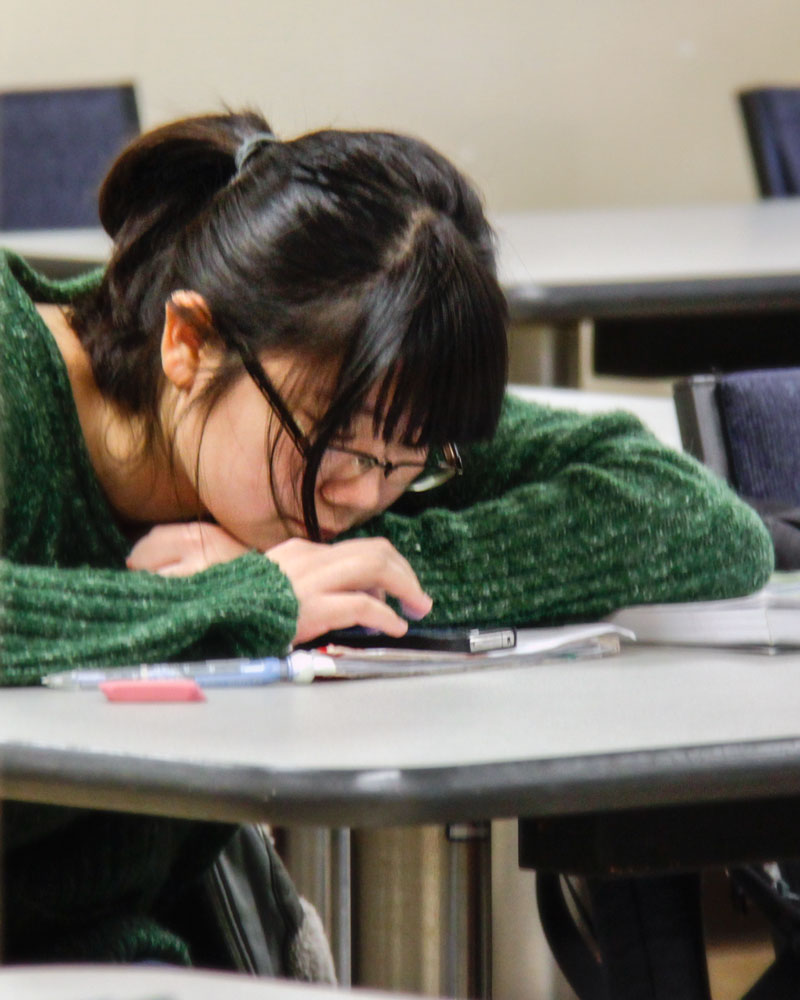
Whether it is sneaking a quick text during class, browsing through Facebook or posting an update on Twitter, most college students will admit to having used their phones in the classroom at some point.
According to a study complied at Wilkes University in Pennsylvania, 91 percent of college students admit to having used their cell phones during class.
Due to such high statistics, several Murray State professors have implemented a zero-tolerance policy toward cell phone use in the classroom.
Among these professors, Winfield Rose, professor of government, law and international affairs, said his biggest objection to cell phone use in the classroom is that it can interrupt the learning process and make it hard for the class to get back on track.
“If a cell phone goes off in class it is a distraction for everyone, for the professor as well as the students,” Rose said. “It is rude to disturb other students who are trying to concentrate on the topic of the day.”
Rose mentions in his syllabus the fact cell phones are not to go off in class and there is no text messaging allowed due to the affect it has on other student’s ability to focus on classroom discussions.
Among those students surveyed in the Wilkes University study, 25 percent said others texting during class makes it difficult to focus and 75 percent reported being distracted by a ringing phone at some point during class.
Bellarmine Ezumah, professor of journalism and mass communication, said her main problem with cell phone use in class is it distracts the student from learning as well as other students who are trying to pay attention.
“My priority is to have students learn,” Ezumah said. “If students are multitasking with things such as texting, there is a higher likelihood that they are not paying close attention and processing everything which is being taught.”
Ezumah said since she mentions in her syllabus as well as the first day of class that texting is not allowed, she has experienced few problems with the issue thus far.
She said if there was a problem with a student persistently texting in class, consequences could result in the student be asked to leave class due to the disruption cell phone use can cause.
According to Bonnie Higginson, vice president of Academic Affairs, students always discover ways to distract themselves from their studies.
“Students have always found ways to be distracted in class,” Higginson said. “Prior to cell phones, students exchanged notes.”
Higginson said a University-wide rule on cell phone use might be something worth exploring for Murray State.
Some Murray State students tend to agree with the professors, saying the main objective of going to class is to learn, not to text.
DePaul Hendrix, junior from Cadiz, Ky., said students need to put cell phones aside to gain their full tuition’s worth and completely grasp the subject matter.
“Students pay for their education, meaning they’re paying the professor to teach them what they need to know,” Hendrix said. “If students are too busy on their phones and not paying attention, then they’re clearly wasting their time and money.”
At Murray State, students with a Kentucky residency and classification of undergraduate pay $285 per credit hour, meaning a typical three hour class costs $855.
Factor in the cost of textbooks averaging at $80-$100, and students can end up losing their time and money from distractions such as texting in class.
According to a recent study done at the University of Pittsburgh, college students who frequently text message during their classes have difficulty staying attentive to classroom lectures, which can consequently lead to poor academic performance.
The study showed texting in class interferes with a student’s ability to pay attention, which is necessary for effective cognitive learning.
Students who did less texting during class tended to be ones who practiced higher levels of self-control and reported paying more attention to the instructor.
Not all students think it should be up to the University to decide on a cell phone use policy.
Other Murray State students believe since they are who is paying for their education, they should ultimately be the ones making the decision on whether it is acceptable to text in class or not.
Becca Kilby, sophomore from Murray, said more professors need to be more understanding with texting occurrence in the classroom, such as when an emergency arises that the student must deal with immediately.
“Sometimes there are situations out of the student’s control,” Kilby said. “When these incidents occur, professors need to be more understanding about cell phones being used and recognize that emergencies do happen.”
In the study done by Wilkes University, 62 percent of students believe texting in class should be allowed, provided it did not distract others around them.
“No distraction is good, but there have always been ways for students to tune out,” Higginson said. “It is my hope that our faculty teaches in a way so that students are inclined to learn instead of being disengaged.”
Story by Rebecca Walter, Staff writer.